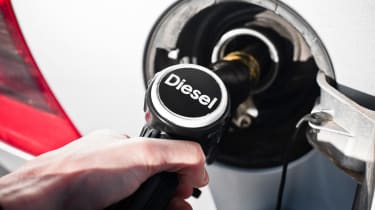We’ve all seen those extra fuel pumps they have at the petrol station. Next to the nozzles for regular unleaded and diesel, you’ll find additional pumps supplying higher octane (and usually more expensive) fuel. It will be branded things like Premium, Super, Ultimate, Nitro+, V-Power, Momentum or such like, and you’ll usually find some accompanying advertising on the pumps promoting their benefits.
The one thing that will put most people off using super petrol or super diesel is the higher price of these premium fuels, but if you drive a performance car, it could be worth your while investing in a tankful. Not only will it make the most of your car’s performance, but premium fuels will also help to prevent potential costly engine repair bills in the future. So what are the differences between regular gas and these premium or super fuels? Well, the first thing to know is that there is a distinct difference between premium petrol and premium diesel.
Premium petrol
Premium petrol usually has a higher octane rating than regular petrol. Octane is a chemical component of petrol, and the amount of octane contained within the fuel determines how well it will work in higher compression engines – high octane fuel works more effectively than lower rated fuels. The standard rating for petrol in the UK is 95 octane, and every car sold in the UK has its electronics tuned so that it can run properly on this fuel.
• How to cut your fuel costs
In some foreign countries, you can get lower octane rated fuels, but if you add these to your car, it may cause ‘knocking’. This is an engine condition that occurs when the fuel/air mixture in the engine’s cylinder head doesn’t burn properly, causing the engine to sound rough, with a pinging noise when it’s running. In most cases it will result in rough running, although in the worst-case scenario there is the potential for engine failure if you use low octane fuel regularly.

At the other end of the spectrum, some high-performance cars may suffer from knock when using regular 95 octane fuel. That’s because the engines in performance cars can feature a high compression ratio – the difference in size of the combustion chamber between the cylinder’s lowest and highest points. As a result, these engines will need a higher octane-rated fuel to work effectively. If your car needs high octane fuel, it will be noted in the owner’s manual, while most cars have a label on the inside of the fuel filler flap which shows what kind of fuel you can use.
Premium diesel
Because diesel engines don’t ignite fuel to create power (fuel is added to the air that is compressed instead), premium diesel doesn’t usually feature a higher octane rating. Instead, this more expensive super diesel will feature chemicals in its mixture that are designed to shift soot deposits and other oily build-up from within the engine’s fuel system.
So why choose super fuels?
If you drive an ordinary mainstream car, then there’s not much point in paying extra for premium fuels. Your car has been set up to work properly using standard petrol and diesel, and fuel companies have created their regular gas to work effectively in your engine.
• Should your next car be petrol or diesel?
However, if you drive a diesel car, there’s no harm in running a tankful of super diesel through the engine every 1,000 miles or so. This should clear out any oily or sooty deposits from the engine and fuel system, and will help your car to be more efficient and economical when running on regular diesel, as the fuel system will be clearer. In the long run, paying an extra 5-10p per litre for super diesel every now and again could help to avoid costly future repairs if your diesel engine packs up.

The real benefits of super fuels can be had by owners of performance cars, even hot hatchbacks. While many of these cars will work perfectly well on regular petrol, you should be able to tell the difference if you fill your tank with high-octane fuel. Improved throttle response will be the clearest indication of its benefit, while the engine should rev more freely and should deliver more power.
While some companies only go for 97 or 98 octane fuel, you can get 100 octane gas at some leading retailers – even at supermarkets – and while it will carry a 10p per litre premium over regular petrol, your performance car will benefit greatly from a higher octane-rated fuel.
• Most economical cars 2018
Not only will you see an improvement in performance, but efficiency could also benefit. As high-compression engines are designed to work with higher octane ratings, fuel economy will remain the same at the very least, and could even improve slightly.
If you’re worried about the cost of high-octane fuel, there’s probably nothing stopping you from still using regular petrol, but like a diesel, your car will benefit greatly if you stick a tankful of high octane fuel in it every now and again.

